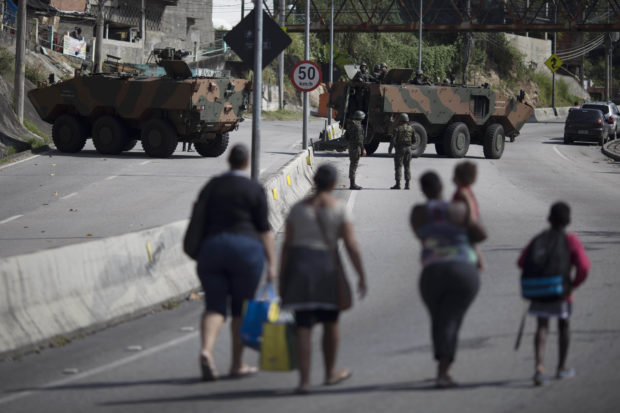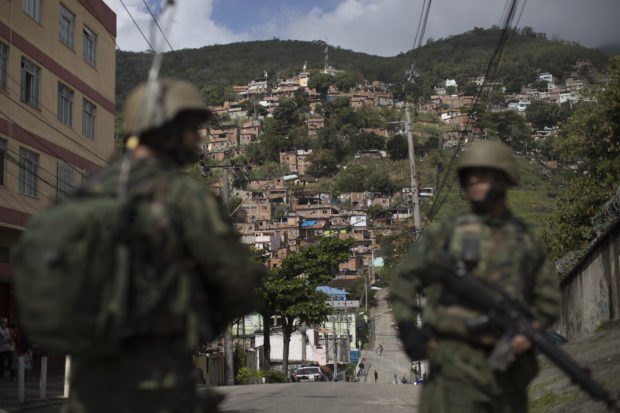4,800 Brazilian soldiers, cops storm into Rio slums amid violence spike

Armored vehicles block the road as soldiers patrol at the Lins Complex slums in Rio de Janeiro, Brazil, Saturday, Aug. 5, 2017. More than 4,800 Brazilian soldiers are occupying a series of slum communities in northern Rio de Janeiro as part of efforts to combat a spike in violence. AP
SAO PAULO, Brazil — More than 4,800 Brazilian soldiers and police are occupying a series of slum communities in northern Rio de Janeiro as part of efforts to combat a spike in violence.
The troops moved into the Complexo do Lins communities and neighboring Camarista Meier in the early hours of Saturday. Defense Minister Raul Jungmann told Globo TV that the troops would stay there as long as necessary.
Last week 8,500 soldiers were deployed in Rio to fight organized crime gangs, which control many of the city’s slums.
Brazilian television showed soldiers armed with automatic rifles sitting atop tanks as they patrolled the communities.
Mounting violence in Rio has led authorities to acknowledge in recent weeks that much of the city is out of their control.
Article continues after this advertisementFive favelas were targeted by about 1,300 police and 3,600 troops in a sweep starting at 4 am (0700 GMT), the Rio state security service said in a statement.
Article continues after this advertisement
Soldiers patrol the Lins Complex slums in Rio de Janeiro, Brazil, Saturday, Aug. 5, 2017. AP
Their main goal was to stop gangs behind a surge in brazen robberies of commercial trucks, with arrest warrants issued for 40 people. Rio state authorities say there were 10,000 cases of cargo theft last year.
By late afternoon, 24 adults and two teens had been arrested and two killed “in confrontations,” Rio state security chief Robert Sa said. A police officer was killed when a bus crashed into his vehicle with two detainees inside.
Twenty-one vehicles, weapons, drugs and goods stolen from trucks were impounded.
But the decision to flood some of Rio’s most dangerous streets with heavily armed soldiers also reflected fears that nearly bankrupt post-Olympic Rio is spinning out of control.

Soldiers patrol at the Lins Complex slums in Rio de Janeiro, Brazil, Saturday, Aug. 5, 2017. AP
The troops were part of 8,500 deployed to the city last month in a tacit acknowledgement that cash-strapped police have lost the ability to cope.
In Lins favela — one of the many little-regulated, and often gang-plagued communities of working class Brazilians that rise on the city’s forest-clad hills — soldiers took positions at every crossroads and outside many alleyways.
Troops, backed by camouflaged armored personnel carriers, stood guard with fingers on the triggers of assault rifles. Units of soldiers and SWAT police also roamed the streets in open Jeeps and SUVs, pointing their weapons out of car windows.
Everyone entering and leaving the favela, in northern Rio, was subjected to an identity check and search, with men required to lift their shirts. One man was questioned at length about a scar on his stomach and another man’s bag was searched only to find he was carrying a large Bible.
The orderly deployment and impressive firepower reassured some. At a time of political and economic turmoil in Brazil, the military is regularly cited as Brazil’s most trusted institution.
“They bring security to us all. There’s so much robbery, so much shooting. With the soldiers, people here feel safer,” said Luiza, a resident of Lins, who like most others was too afraid to be fully identified.
Others, however, were upset at suddenly having to live in the middle of what resembled military rule.
“There’s an atmosphere of tension and fear,” said Vanuza Barroso da Silva, 23, who was leaving Lins to go to her job at a supermarket.
“They treat us as if we’re trash,” her father Roberto, 46, said after going through the search.
Officials said the other favelas targeted were Camarista Meier, Morros de Sao Joao and Engenho Novo in the north and Covanca in the west.
‘They abandoned us’
The crackdown came a year to the day after President Michel Temer opened the Olympics in a lavish ceremony at the Maracana football stadium, which is close to Lins favela.
Rio was the first South American city to host the Games and although the event passed off smoothly, a mixture of corruption scandals, near collapse in the state budget and crime has combined into a serious hangover for what should be one of Brazil’s richest regions.
In the first half of this year, Rio tallied 3,457 homicides, the highest level of violence since 2009 and 15 percent more than during the same period in 2016.
People are killed daily in shootouts between rival gangs competing for control of the favelas or from police action. The shootings, often involving high-powered rifles, also lead to numerous deaths and injuries from stray bullets.
Since the beginning of the year 93 police officers have been killed in Rio state, while units complain of not having enough funds for fuel or even toilet paper.
Brazilian Justice Minister Torquato Jardim said the damage done to criminal groups would be “greater than the mere numbers” of arrests and confiscations.
However, many favela residents fear that Saturday’s operation will be just one more in a long series of dramatic, but ultimately futile raids in neighborhoods ravaged by poverty, government neglect and deeply rooted gangs.
“You can hardly go out for a beer in northern Rio,” said Marta, 40, in Lins.
Asked whether she feared the gangs or the authorities more, she shrugged. “In either case it’s a minority that has weapons,” she said.
Barroso da Silva scoffed at the Rio authorities’ vows of tough action. “They abandoned us,” she said. CBB